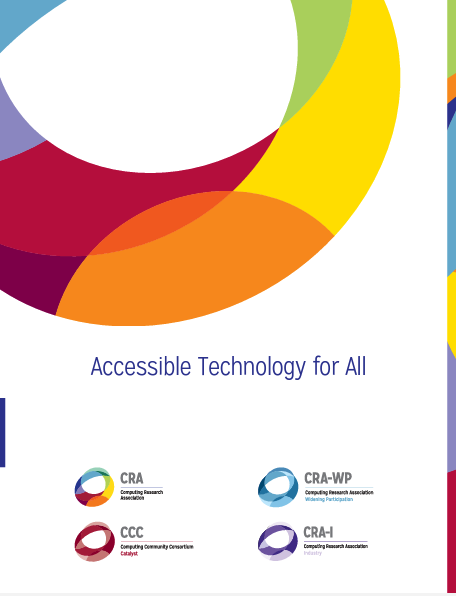Building a More Inclusive Future: Highlights from the CRA Accessible for All Report
 In a rapidly digitizing world, ensuring accessibility for all individuals is crucial.
In a rapidly digitizing world, ensuring accessibility for all individuals is crucial.
In February 2023, the Computing Research Association (CRA) held a workshop on Accessible Technology for All. The workshop was co-hosted by CRA-Industry (CRA-I), Computing Community Consortium (CCC), and CRA-Widening Participation (CRA-WP) and led by a team of organizers from the various CRA committees including Jeanine Cooke (Sandia National Labs / CRA-WP), Shaun Kane (Google), Chris Ramming (VMware / CRA-I), Katie Siek (Indiana University / CCC), and Divesh Srivastava (AT&T / CRA-I). This workshop brought together over 40 participants, 20 being remote, from academia, industry, government, and disability advocacy groups to identify the accessibility challenges and opportunities of the present moment.
CRA is pleased to announce that the workshop report “Accessible Technology for All” has been published. The report underscores the need to address barriers faced by people with disabilities and promote accessibility across various domains.
The six calls to action include:
- Increase funding opportunities for underserved accessibility needs
- Funding bodies should create additional opportunities for research subjects that were identified as underserved.
- Promote accessibility goals in all funded research, not just accessibility research
- Researchers who do not specifically focus on accessibility work should be provided with incentives and support to promote positive accessibility outcomes in their research.
- Increase efforts to improve representation of people with disabilities in technical and research positions
- Increasing representation from people with disabilities in technology and research requires support throughout the education and pipeline.
- Encourage industry-university collaborations (Increase Accessibility in Industry)
- Solving accessibility problems often benefits from collaborations between academia and industry.
- Consider ways to increase awareness of disability-related policy and law
- The legal and policy framework for digital accessibility has a huge impact on when and if technologies and content are made or later become accessible.
- Take a proactive approach to accessibility issues in machine learning
- As machine learning becomes pervasive in the technologies that we use, new accessibility challenges will appear. It is necessary to understand and remediate accessibility problems early and often.
This report is a timely and significant contribution to the pursuit of inclusivity in technology by the research community. By addressing the challenges, promoting collaboration and education, advancing research and development, and advocating for effective policies and standardization, we can pave the way for a more accessible and inclusive future. Embracing these calls to action will not only benefit individuals with disabilities but also enhance the overall user experience and foster innovation in the technology sector.






